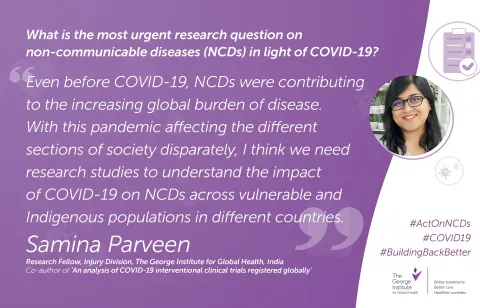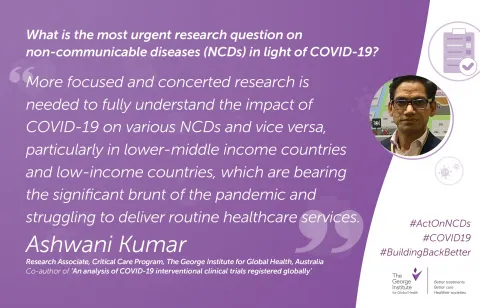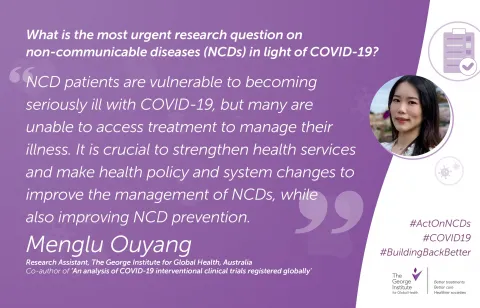Clinical trials are neglecting the interplay between COVID-19 and chronic diseases, analysis shows

People living with non-communicable diseases (NCDs) such as heart disease and diabetes are more vulnerable to becoming severely ill or dying from COVID-19, and yet of all the interventional clinical trials registered globally that relate to COVID-19, less than 4% focus on this high-risk group, an analysis by The George Institute has shown.
The finding is one of a number that highlight alarming gaps in current research when it comes to the intersections between COVID-19 and NCDs. The World Health Organization has termed the relationship a ‘deadly interplay’, and there have been high-profile calls for a syndemic approach that addresses NCDs and socioeconomic inequality together with the coronavirus itself.
Researchers at The George Institute, led by the Rapid Evidence Synthesis team, undertook a systematic analysis of COVID-19-related clinical trials in the World Health Organization’s International Clinical Trials Registry Platform. It found that globally, over 2,180 COVID-19-related interventional clinical trials are underway across 93 countries; the majority focused on pharmaceutical products, including vaccines, and very few focused on the interactions between COVID-19 and NCDs.
In addition to the greater susceptibility of people living with NCDs to the coronavirus, the pandemic has led to massive disruptions in NCD services, resulting in delays to diagnosis, and delayed or interrupted treatment. At the same time, lockdowns to control the pandemic have seen risk factors for NCDs rise, including physical inactivity and increased smoking and alcohol consumption.
Despite this, The George Institute’s analysis found that just 5% of COVID-19-related, interventional clinical trials focus on NCD control in the context of the pandemic. Of those that do, most (74%) are investigating mental health conditions, with only 3% looking at cardiovascular disease, and 4% looking at endocrine, nutritional or metabolic diseases.
Educating people about the risks of COVID-19 and influencing their behaviour are recognised as key to efforts to control the spread of the pandemic and mitigate its impacts. And yet of the small number of trials focused on people with at least one NCD, more than 73% were found to focus on drug interventions, highlighting the urgent need to build the evidence base on a broader range of interventions, including educational and behavioural programmes.
A further gap exposed by the analysis is that while four out of five people with an NCD live in a low- or middle-income country, of all COVID-19-related interventional clinical trials, only one trial related to NCD control, and two trials focused specifically on people living with NCDs, are being conducted in lower-middle-income countries. No trials in either of these categories are being conducted in low-income countries.
The analysis was conducted by Soumyadeep Bhaumik, Ashwani Kumar, Jessica Gong, Xuejun Yin, Menglu Ouyang, Jessica Li, Joseph Alvin Santos, Brendan Smyth, Vikash R Keshri, Samina Parveen, Anthony Paulo Sunjaya and Whenayon Simeon Ajisegiri. The team downloaded the data on 29 June 2020.
You can read their findings in full here, and see them at a glance here.
Gallery
Stay connected and updated
Subscribe to our mailing list for the latest news, events, and updates in health research.
















